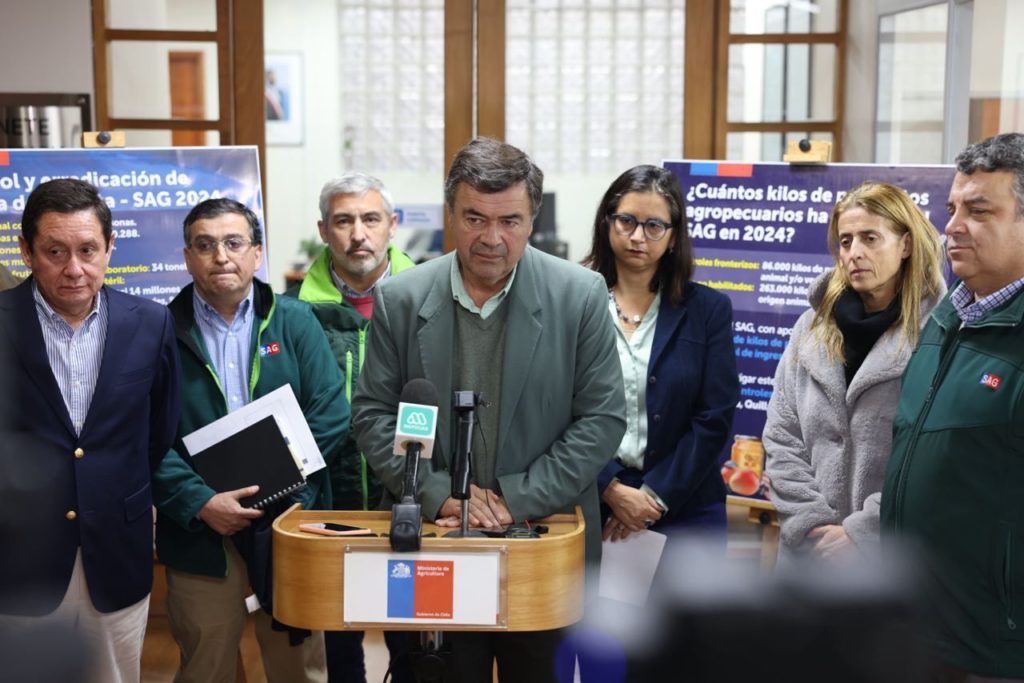Collaborative Efforts Aimed at Safeguarding Chile’s Agricultural Status
Santiago, June 11, 2024 – This morning, at the Ministry of Agriculture, the first session of the Fruit Fly Council was held, led by Undersecretary of Agriculture Ignacia Fernández and the National Director of the Agricultural and Livestock Service (SAG), José Guajardo Reyes. The council was created with the aim of jointly addressing strategies to combat the fruit fly with other agricultural agencies, guild representatives, and the export sector, to maintain Chile’s status as a country free of this dreaded agricultural pest.
The meeting, attended by representatives from the Agricultural Research Institute (INIA), the Office of Agricultural Studies and Policies (ODEPA), Fruits of Chile, Fedefruta, Wines of Chile, the Cherry Committee, and ANPROS, reviewed the state of the pest in the country in 2024. It also discussed the extensive fieldwork being carried out by SAG in various eradication campaigns for fruit fly outbreaks spanning from the Arica and Parinacota regions to O’Higgins, and how this relates to the illegal entry of agricultural products from the northern macrozone.
In this regard, Undersecretary Fernández stated, “This is a collaborative effort between the public and private sectors to control and raise awareness about the work we are doing as a ministry, primarily through SAG, regarding the outbreaks of the fruit fly. First and foremost, it is important to reinforce that Chile maintains its status as a fruit fly-free country, and the outbreaks we observe today do not modify or alter that condition because there is significant control and surveillance. In 2023, there were 24 outbreaks, and today there are 22, with the main reasons being rather structural phenomena related to climate change and also the illegal entry of fruits, vegetables, and fresh products through unauthorized passages.”
Similarly, Minister of Agriculture Esteban Valenzuela appreciated the joint efforts being made to maintain phytosanitary security and called on neighboring countries like Peru, Bolivia, and Argentina to assist in these efforts. He emphasized the importance of understanding that, for instance, at the Cristo Redentor border crossing, SAG inspects driver cabins due to recurring findings of fruit carrying unfortunate pests, highlighting the need for strictness in safeguarding the country.
Furthermore, Undersecretary Fernández highlighted the existence of sanitary barriers installed by SAG in the northern macrozone to enhance surveillance measures. She added that “some legislative alternatives are being reviewed to strengthen sanctions, which are also an important issue, as often, despite SAG’s controls and interceptions, illegal entries recur because unfortunately, the regulations we currently have allow for quite limited sanctions.”
SAG National Director José Guajardo Reyes thanked “this space, which has allowed us to expand our conversation table that we usually have with fruit and productive guilds to other public bodies. Avoiding this plague for us has implications in an area that we have worked on strongly with the Ministry of Agriculture, which is food security. The fruit fly affects fruit production and damages international trade. Annually, over 2.8 billion tons of fruit are sent abroad, taking advantage of the counter-season we have with Northern Hemisphere countries, and that implies business worth over $6.5 billion. This is of vital importance to us because the fruit industry generates more than 570,000 jobs, so any problem can also generate significant social impact, for which we take responsibility.”
Miguel Canala-Echeverría, general manager of Fruits of Chile, appreciated the efforts made by the Ministry of Agriculture, through SAG, to maintain Chile’s status as a fruit fly-free country, stating that “for our sector, this issue is strategic. We are the only country in Latin America that is free of this pest, and it is a very important competitive condition. The Government has taken it as a relevant fact and has allocated over 10 billion pesos in expenses that have been incurred for this purpose; there are sanitary barriers to control the traffic of illegal products, which is the main issue that concerns us… in other words, everything that technology allows has been done to control these outbreaks.”
Finally, Canala-Echeverría added, “we are concerned about what is happening in Chimbarongo, especially, which is an important cherry-producing area, a highly appreciated product that goes to China, where this pest is considered a risk. Therefore, we will have to take some operational measures. We are coordinating with SAG to address logistical issues so that all the fruit from that area, which is about 25% or 30% of cherry production, will have to undergo a cold treatment, with a large public-private logistical effort, so that this export program can proceed normally.”
Error



